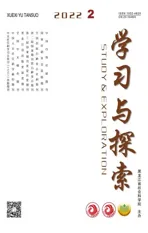ABSTRACTS
2022-12-18
The Genealogy of Language from a Viewpoint of Philosophical Anthropology
DENG Xiao-mang
(SchoolofPhilosophy,HuazhongUniversityofScienceandTechnology,Wuhan430074,China)
Abstract:The origin of language as essential attribute of human beings could only be properly explained from human productive labor, the exact starting point of the “difference between men and apes”. Besides producing and using tools, it is carrying tools with themselves that constitutes another important basic characteristic of human productive labor. Carrying tools turns a tool as something natural into humanly “extended hand” and consequently puts nature and man, individual and group into a dialectical relationship of self-negation which embodies identity and difference at the same time. This dialectical structure internalizes itself into the structure of human mind, which becomes the origin of human language (both gesture and speech) and causes the “recursion” of self-negation in language. This is why human language functions as a universal media of social communications. It is the foundation for the identity of thing and mind, oneself and other in human self-consciousness as well. The genealogy of language from a viewpoint of philosophical anthropology could solve many puzzles which can not be dealt with by positive anthropology.
Keywords:Philosophical Anthropology; Carrying Tools; Genealogy of Language; Self-negation; Structure of Self-consciousness
On the Legal Regulation of Super Platform Data Monopoly
FU Xin-hua
(LawSchool,BeijingJiaotongUniversity,Beijing100044,China)
Abstract:As a new production factor, data can only create more value by opening and sharing it. The monopoly of data resources by super platforms has caused structural damage to the fair market competition environment. As the current mainstream anti-monopoly theory, “price theory” cannot effectively identify and regulate platform monopoly, and faces certain theoretical limitations and application difficulties. The public utility theory provides theoretical tools such as structural isolation, public obligation, and public choice for the legal regulation of data monopoly on super platforms. It is not a substitute for anti-monopoly law, but an effective supplement to anti-monopoly law. The two are complementary and parallel. Under the dual regulation path of public utility theory and anti-monopoly law, it is helpful to transcend the single perspective of ex post accountability, and establish a dynamic supervisory accountability system that runs through “before-during-after”, including ex-ante structural regulation and public obligation setting, obligatory compliance review and alternative punishment during the event, and antitrust regulations after the event, etc.
Keywords:Data Monopoly; Platform Monopoly; Public Utility Theory; Super Platform
The Fundamental Socialist Economic Institutions and the Long-term Economic Growth Miracle of China
ZHAO Feng, TAN Xuan, ZHAO Yuan-yuan
(SchoolofEconomics,RenminUniversityofChina,Beijing100872,China)
Abstract:Since Reform and Opening-up, China’s economy has experienced a long-term, high-speed and stable growth. The fundamental guarantee of this miracle is the basic economic system of socialism with Chinese characteristics established by Chinese people under the leadership of the Communist Party of China in socialist economic construction. The fact that the ownership of the means of production can fully adapt to the trend of production socialization not only plays an important role in promoting technological innovation and maintaining the balance of the national economy, but also can overcome the disadvantage of latecomers, effectively concentrate social surplus products and improve the overall level of economic accumulation. The socialist market economic system can better solve the problem of cooperation between heterogeneous subjects in the socialized production. While forming an independent market competition relationship among various ownerships, it can maintain the direct social nature of the production activities of the public ownership economy, and reflect the socialist nature in the fields of production, distribution and exchange. At the same time, the government can play an important role in achieving long-term control goals, diversifying means, and taking the major proportions of all aspects into account. The socialist distribution system can not only adapt to and stably reproduce the current ownership of the means of production, but also coordinate the benefits of the owners of various factors of production and adjust the proportional relationship of the national economy. The most important thing is that the leadership of the Communist Party of China is the premise of the basic socialist economic system. And it is also the key subject to realizing the unity of “regularity” and “purpose” of social and economic development in “itself” socialism. The socialist economic construction with Chinese characteristics has entered a new era, and the goal of economic development has shifted from high speed to high quality. It is necessary for us to further strengthen the party’s leadership and optimize the basic socialist economic system now.
Keywords:Fundamental Socialist Economic Institutions; Economic Growth; Institutional Advantages; the Party’s Leadership
The Origin, Naming, Proof and Cross-contextual Response of “Literary Event”
LIU Yang
(DepartmentofChineseLanguageandLiterature,EastChinaNormalUniversity,Shanghai200241,China)
Abstract:“ Literary event” seems to be a ready-made concept in the academic impression, but an in-depth investigation shows that its theoretical foundation has not been fully established and its pedigree has yet to be explored. The three key points of European origin, Anglo-American naming and orientalized response draw the theoretical track of the direct connection between “event” and “literature” in turn. Maurice Blanchot replaces existence with void and establishes a new aspect of extraordinary evens based on existence, which is accompanied by a positive assessment of the power of literature. Derek Attridge rather than Eagleton put forward the concept of “literary event” for the first time, focusing on language to clarify the differences between singularity and contingency, uniqueness and aura, which ignited the significance of reading in this type of event. Komori Yoichi continuously deepens the reading of “literary event” from the perspective of metaphor and infinite differentiation, which makes it gradually become a new growing point in the study of recent literary theory.
Keywords:Literary Event; Cross-context; Language; Singularity; Reading
